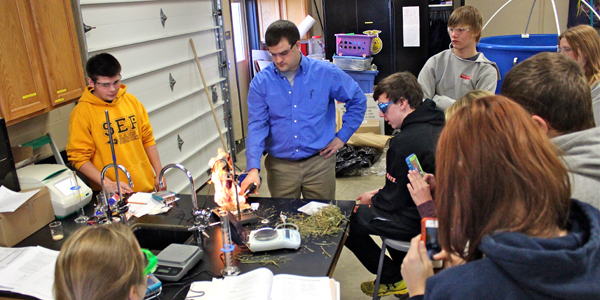
Igniting An Interest In Agriscience
Matthew Eddy taps his forehead. “Remember what you’re forgetting,” he tells one of his students.
They are getting ready to set fire to various feedstuffs. The student nods as she realizes she’s forgotten her safety glasses. Students measure the mass of the feedstuff before and after the burn. The change in temperature of a known quantity of water will indicate how much energy is released from each type of feed.
The students are excited. Eddy smiles and walks over with his small torch after a student calls out, “Bring the heat, Eddy! We’re ready.”
The flame grabs hold of the hay and begins to smolder. Students snap photos with cell phone cameras. Tweets abound. (#agedrocks #playingwithfire)
Eddy (’99 agricultural and life sciences education, ’08 MS) and his Southeast Polk High School agriculture students use the Curriculum for Agricultural Science Education (CASE). The national program was designed by agricultural educators and launched in 2009.
Thanks to grants Eddy successfully landed, the agriculture lab gives students a glimpse into technology similar to what’s available at multinational agribusinesses.
“I could do these labs with a Dixie cup, but that’s not what Pioneer does,” Eddy says. “This equipment is the same stuff you’ll find in biotechnology labs in industry.”
Having a packaged curriculum and receiving training to implement it takes a lot off of teachers’ plates, Eddy says, so they can focus on maximizing students’ experience.
Ready-made curriculum
“The CASE curriculum is like a paint-by-number to Picasso,” Eddy says. “It helps new teachers deal with the rigors of creating such a program from scratch. It provides much needed structure for teachers of all experience levels. And CASE provides continuity for school districts experiencing turnover.”
Mike Retallick (’05 PhD agricultural and life sciences education), associate professor of agricultural education and studies at Iowa State University, coordinates certification in CASE for Iowa educators.
Last summer nearly 80 Iowa agriculture teachers were certified to help students advance in math and science under Retallick’s leadership. He represents Iowa on the national advisory board of CASE and as the state leader he works with teachers hired to train agriculture educators on how to implement new curriculum.
“This program increases student understanding in math and science through the context of agriculture,” Retallick says. “The inquiry-based teaching methods used in CASE develop students into problem solvers, critical thinkers and lifelong learners.”
The Iowa Governor’s STEM (Science,Technology, Engineering and Math) Advisory Council awarded funding for the program to Iowa’s TEAM AgEd, which promotes agricultural education. The team includes Iowa State’s agricultural education and studies department, the Iowa Department of Education, Iowa agriculture teachers, the Iowa FFA Association and the Iowa FFA Foundation.
Josh Remington (’06 horticulture), executive director of the Iowa FFA Foundation, Eddy, Retallick and several other high school agriculture teachers prepared the grant proposal. The grants aim to boost student interest and achievement in STEM topics.
The grant funded access to the curriculum, equipment and 80 hours of professional development.
Introducing students to agriculture
Drawn in by science—and curiosity— students in Eddy’s classes are exposed to concepts that run the gamut of the agriculture industry. Agriculture courses in his urban-based school near Des Moines are full. “Out of our 200 FFA members, I can count on one hand the number that are from a farm,” Eddy says.
The focus on science allows him to reach students not otherwise engaged in agriculture. He can spark an interest in science for those not motivated to understand basic science concepts.
“I’ve found that a student who is getting C’s and D’s in science seem to get it here. We’re doing the same science, but in a way that frames it in the real world,” Eddy says. “The best part is awakening the kids who won’t think they’ll like science or agriculture, then they do.”
Eddy says agriculture should be required coursework for all U.S. high schoolers. “Students don’t know how or where their food is produced. They don’t understand the technology or the process involved,” Eddy says. “We can help fill the gap so they may have informed opinions as adult consumers.”
Multifaceted approach
The CASE curriculum is one component of Eddy’s agricultural program that, like others, includes supervised agricultural experiences to allow students to explore agricultural careers before graduation.
The experiences range from home gardens to part-time jobs in agricultural businesses to raising animals or crops for profit. Keeping careful records allows students to gain business skills and learn from both successes and setbacks in a supportive environment.
The Southeast Polk FFA Chapter also hosts the Animal Learning Center at the Iowa State Fair each year, which gives nonfarm students the opportunity to interact with animals while teaching the public about livestock. The chapter educates 750,000 visitors per year about how the animals are raised and handled. The hands-on experience in production agriculture complements CASE’s science based curriculum.
Once familiar with agriculture, Eddy says his students are excited by the opportunities they see in the industry. “Ag is cool again,” he says. “It’s thriving, and they’re excited by the career possibilities.”



